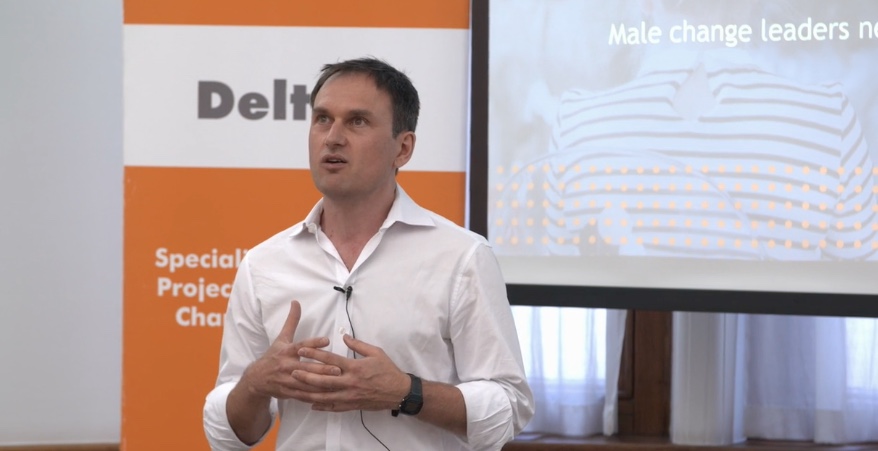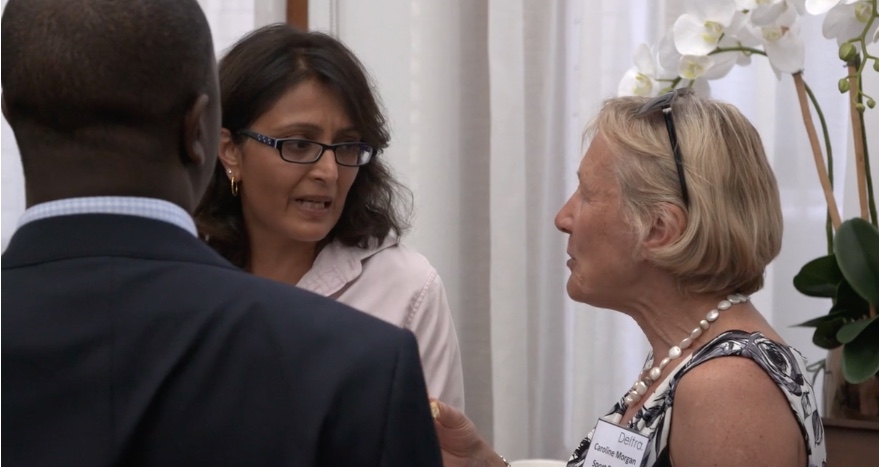The Moral and Performance Case for Women In Transformation
Following on from the success of our first iteration of the series, we were delighted to be able to host our second Women In Transformation event on the 2nd of July. This time we explored the topic of diversity in the transformation space from a performance angle rather than morally.
As recruiters within the transformation space, often for senior positions, we feel it’s our responsibility to help guide our clients on how to approach diversity when hiring. As our Managing Director, Minesh Jobanputra, put it: “Diversity in general has always been an important issue for Deltra, but we’re focusing on gender bias in particular as there’s an inherent lack of women in transformation, and if we’re talking about transformations that fail where there’s also a lack of women in the business – there must be some sort of correlation in our view.”
We’re always looking to improve our events, and one of the key discussion points from our last event was that male colleagues can often be our best allies in the fight for equality. Having taken on some feedback about getting more male business transformation professionals in the room so we can tackle the subject together as a united front, the attendee list was a lot more mixed this time round.

We were joined by the wonderful Tony Sweeney, CIO at Close Brothers, who brought with him a wealth of experience in implementing transformations across telecoms, dot com, financial services and the gambling industry. The subject of gender diversity is one that’s quite close to Tony’s heart and something he’s dedicated a lot of time into researching, although successfully driving change is still very much at the crux of the matter.
Tony’s opening statement was that in his experience, due to the unique innate skillset that women possess, they often make better change leaders than men. This point of view was based in research as well as anecdotally, in fact the statistics of a 2012 Harvard Business Review study on whether women make better leaders than men spoke for themselves. The study took into account top leadership skills like taking initiative, practicing self-development, integrity and honesty, driving for results and many more.
“Diversity in general has always been an important issue for Deltra, but we’re focusing on gender bias in particular as there’s an inherent lack of women in transformation, and if we’re talking about transformations that fail where there’s also a lack of women in the business – there must be some sort of correlation in our view.”
Not only did Tony reveal that the softer skillset needed to properly embed change is typically found in women, but a deep dive into the history of transformation suggests that those who have driven change successfully have also taken on female traits to achieve this. Taking into account the history of true change, while looking at some of the great change leaders throughout time - ranging from Julius Caesar to Abraham Lincoln, something that occurred to Tony was that it was in fact many of the softer traits such as people management and emotional intelligence that pushed these various changes through.
A misunderstanding of the transformation skillset
Despite the strong evidence of the contrary, important skills such as the ability to read a room and subtly leverage the people in it are still taken for granted or even considered a weakness in some industries. One attendee revealed that she’s often thought of as “too soft”, even though her approach of persuading rather than enforcing seems to have worked wonders in organisations throughout her illustrious career.
This was echoed by another attendee who, while management worried that she wouldn’t be respected enough, swears by being able to switch between being friendly and personable and also being known as a “taskmaster” when it comes to pushing change through.
These anecdotes are all based in truth as it’s been proven time and time again that in order for real lasting change to take place, those involved need to be on board with the decision or ultimately the transformation won’t be adopted long term. One attendee made the distinction between the delivery skillset and the more person-centred transformation skillset, stating that it’s usually an entirely different type of person who can embed change and make it stick.
The ability to shift between genuine personal chat and simultaneously get things done is crucial to developing the kinds of relationships you need within your organisation to push change through. According to Tony’s hypothesis: generally speaking, women seem to know how to properly leverage more caring behaviours in order to embed change – something he believes men in transformation could stand to learn as it builds trust and buy in from teams and suppliers alike.
"Nobody ever embedded real change using Gantt charts."
In fact, various male attendees in the room echoed Tony’s comments, stating that they’d historically struggled to build those sorts of relationships – not through lack of trying but more through a misguided emphasis on the technical implementation skillset from management.
On the surface, this seems like a men vs women issue when in actual fact it’s simply a grave misunderstanding of the skills needed in transformation and change. It became clear that a cultural shift needs to take place whereby the softer innate skills are actually prioritised in business transformation recruitment rather than the more technical harder skills which, unlike the former, can almost always be trained - as Tony very aptly said during the debate “nobody ever embedded real change using Gantt charts”. One attendee agreed, expressing that often those who have joined her organisation without the technical skills, but had soft skills aplenty, went on to be more successful in the long run.
The role recruitment has to play
As the evening went on, there was a distinct shift from a discussion specifically about gender diversity to diversity in general, or rather the lack thereof. Many attendees expressed a need for change in the recruitment process overall, with the very same pool of candidates circling round their industry and rarely looking outside of it. The reason this is problematic isn’t just because organisations aren’t giving women and other marginalised groups a fair chance, but it also means the skillsets and experience being passed around the industry is very similar.
As one attendee put it: “You’re basically regurgitating the same group of people, so there’s no diversity in skillset going on. I see a job get posted, only to be reposted again 4 weeks down the line. That tells me they aren’t finding what they really want.”
Another attendee offered a solution to the problem, affirming that a way to combat this “regurgitation” of candidates is to hire from outside of your industry to breathe new life into your business: “In my experience when hiring for financial services, we decided to mix things up and look at candidates from banking or telecoms instead just to diversify our teams a little more otherwise you’re not getting any new skills into the business, which is important when you’re looking to deliver change.”
“There are lots of things we can do to help, we all have bias but we can try to combat that from the way we write our job ads, to how we spec CVs.”
Towards the end of our discussion session, one attendee shared some valuable insight from her current employers, who are taking huge steps to diversify their workforce as a business. “There are lots of things we can do to help, we all have bias but we can try to combat that from the way we write our job ads, to how we spec CVs.” She went on to explain that in her organisation they cannot recruit unless the candidate pool is diverse enough, because if not then there’s no chance whatsoever of having a more balanced workforce.
She added the caveat that simply injecting diversity into your organisation isn’t enough, you also need to ensure those diverse voices are properly included and are given the opportunity to forge real success. Oftentimes, a diverse workforce is brought in, isn’t made to feel part of the team and will subsequently leave to go elsewhere – meaning that your organisation then doesn’t reap any of the benefits of having a more diverse skillset and perspective.

This iteration of our Women In Transformation series was, by far, our most interactive session yet. Attendees not only shared their observations of various examples of gender bias in transformation, but also were keen to exchange lessons learned from their careers that could help turn our diversity issue on its head.
We certainly found this to be a real learning curve to better understand how we can help our clients bring the right people on board to make these transformations happen. We all have a role to play in the fight against bias in recruitment. Knowing when to push back and challenge certain ideas is one thing that we can do as recruiters to ensure our clients meet their business transformation goals.
Although we’re a long way from resolving the issue of gender bias and a lack of diversity in the transformation space, all of us came away from the Women In Transformation event with a sense of positivity that change is indeed on the horizon. The team at Deltra are incredibly keen to keep this conversation going, so keep an eye out for updates on our next Women In Transformation event.
If you’re interested in learning more about our Women In Transformation events, or any of our other roundtable discussion groups, please don’t hesitate to get in touch or call us directly on 0207 375 9500.
29th July
Events Women in Transformation
Related insight
Related News
Looking to
transform?
Quicklinks

Address
Deltra Group
52-54 Gracechurch St
London
EC3V 0EH
Contact
+44 (0)207 375 9500
info@deltragroup.com



